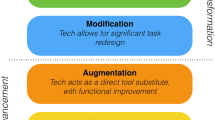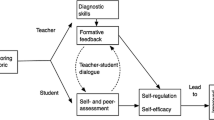Abstract
This study tested a hypothesis that focused on whether or not teachers’ pedagogical content knowledge (PCK) is a necessary body of knowledge for reformed science teaching. This study utilized a quantitative research method to investigate the correlation between a teacher’s PCK level as measured by the PCK rubric (Park et al. 2008) and the degree to which his/her classroom is reform-oriented as measured by RTOP (Sawada et al. 2002). Data included 33 instructional sessions of photosynthesis and heredity videotaped with 7 high school biology teachers. Each session was given a score on both the PCK rubric and RTOP by two independent raters. Results indicate that PCK score is significantly related to RTOP score in terms of both total score (r = .831, p < .01) and sub-component scores (ranging from r = .616 to .805, p < .01). Implications for science teacher education and future research are discussed.
Similar content being viewed by others
References
Abell, S. K. (2007). Research on science teacher knowledge. In S. K. Abell & N. G. Lederman (Eds.), Handbook of research on science education (pp. 1105–1149). Mahwah: Erlbaum.
American Association for the Advancement of Science. (1989). Project 2061: Science for all Americans. Washington, DC: American Association for the Advancement of Science.
American Association for the Advancement of Science. (1993). Benchmarks for science literacy. Oxford: Oxford University Press.
Anderson, R. D., Anderson, B. L., Varank-Martin, M. A., Romagnano, L., Bielenberg, J., Flory, M., et al. (1994). Issues of curriculum reform in science, mathematics and higher order thinking across the disciplines. Washington, DC: U.S. Government Printing Office.
Barnett, J., & Hodson, D. (2001). Pedagogical context knowledge: toward a fuller understanding of what good science teachers know. Science & Education, 85, 426–453.
Borko, H., & Putnam, R. T. (1996). Learning to teach. In D. C. Berliner & R. C. Calfee (Eds.), Handbook of educational psychology (pp. 673–708). New York: Macmillan.
Bullough, R. V., Jr. (2001). Pedagogical content knowledge circa 1907 and 1987: a study in the history of an idea. Teaching and Teacher Education, 17, 655–666.
Bybee, R. W. (1993). Reforming science education: Social perspectives and personal reflections. New York: Teachers College Press.
Carpenter, T., Fennema, E., Peterson, P., & Carey, D. (1988). Teachers’ pedagogical content knowledge of students’ problem-solving I elementary arithmetic. Journal for Research in Mathematics Education, 19, 385–401.
Carter, K. (1990). Teachers’ knowledge and learning to teach. In W. R. Houston & M. H. J. Sikula (Eds.), Handbook of research on teacher education (pp. 291–310). New York: Macmillan.
Clermont, C. P., Krajcik, J. S., & Borko, H. (1993). The influence of an intensive in service workshop on pedagogical content knowledge growth among novice chemical demonstrators. Journal of Research in Science Teaching, 29, 471–485.
Clermont, C. P., Borko, H., & Krajcik, J. S. (1994). Comparative study of the pedagogical content knowledge of experienced and novice chemical demonstrators. Journal of Research in Science Teaching, 31, 419–441.
Cochran, K. F., Deruiter, J. A., & King, R. A. (1993). Pedagogical content knowing: an integrative model for teacher preparation. Journal of Teacher Education, 44(1), 263–272.
Cochran-Smith, M., & Fries, M. K. (2001). Sticks, stones, and ideology: the discourse of reform in teacher education of reform in teacher education. Educational Researcher, 30(8), 3–15.
Driver, R., Asako, H., Leach, J., Mortimer, E., & Scott, P. (1994). Constructing scientific knowledge in the classroom. Educational Researcher, 23, 5–12.
Fenstermacher, G. D. (1994). The knower and the known: the nature of knowledge in research on teaching. Review of Research in Education, 20, 3–56.
Geddis, A. N. (1993). Transforming subject-matter knowledge: the role of pedagogical knowledge in learning to reflect on teaching. International Journal of Science Education, 15(6), 673–683.
Grossman, P. L. (1990). The making of a teacher: Teacher knowledge and teacher education. New York: Teachers College Press.
Hashweh, M. Z. (1987). Effects of subject-matter knowledge in the teaching on biology and physics. Teaching & Teacher Education, 3(2), 109–120.
Hashweh, M. Z. (2005). Teacher pedagogical constructions: a reconfiguration of pedagogical content knowledge. Teachers and Teaching: Theory and practice, 11(3), 273–292.
Henze, I., Van Driel, J. H., & Verloop, N. (2008). The development of experienced science teachers’ pedagogical content knowledge of models of the solar system and the Universe. International Journal of Science Education, 30(10), 1321–1342.
Hollon, R. E., Roth, K. J., & Anderson, C. W. (1991). Science teachers' conceptions of teaching and learning. In J. Brophy (Ed.), Advances in research on teaching (Vol. 2, pp. 145–186). Greenwich: JAI.
Holmes Group. (1986). Tomorrow’s teachers. East Lansing: Holmes Group.
Lederman, N. G., Gess-Newsome, J., & Latz, M. S. (1994). The nature and development of preservice science teachers' conceptions of subject matter and pedagogy. Journal of Research in Science Teaching, 31(2), 129–146.
Lee, E., Brown, M. N., Luft, J. A., & Roehrig, G. H. (2007). Assessing beginning science teachers' PCK: pilot year results. School Science and Mathematics, 107(2), 418–426.
Loughran, J., Berry, A., & Mulhall, P. (2006). Understanding and developing science teachers’ pedagogical content knowledge. Rotterdam: Sense.
Loughran, J., Mulhall, P., & Berry, A. (2008). Exploring pedagogical content knowledge in science teacher education. International Journal of Science Education, 30(10), 1301–1320.
Luera, G. R., & Otto, C. A. (2005). Development and evaluation of an inquiry-based elementary science teacher education program reflecting current reform movements. Journal of Science Teacher Education, 16, 241–258.
Magnusson, S., Krajcik, L., & Borko, H. (1999). Nature, sources and development of pedagogical content knowledge. In J. Gess-Newsome & N. G. Lederman (Eds.), Examining pedagogical content knowledge (pp. 95–132). Dordrecht: Kluwer.
Marks, R. (1990). Pedagogical content knowledge: from a mathematical case to a modified conception. Journal of teacher education, 41(3), 3–11.
McEwan, H., & Bull, B. (1991). The pedagogic nature of subject matter knowledge. American Educational Research Journal, 28, 316–334.
National Board for Professional Teaching Standards (NBPTS). (2004). Five core propositions. Retrieved February, 23, 2004 from http://www.nbpts.org/about/coreprops.cfm.
National Commission on Excellence in Education. (1983). A nation at risk: The imperative for educational reform. Washington, DC: U.S. Government Printing Office.
National Research Council. (1996). National science education standards. Washington, DC: National Academy Press.
National Science Teachers Association. (2003). Standards for science teacher preparation. Arlington: NSTA.
Nelson, B. (1992). Teachers’ special knowledge. Educational Researcher, 21(9), 32–33.
Park, S., & Oliver, J. S. (2008a). Revisiting the conceptualisation of pedagogical content knowledge (PCK): PCK as a conceptual tool to understand teachers as professionals. Research in Science Education, 38(3), 261–284.
Park, S., & Oliver, J. S. (2008b). National Board Certification (NBC) as a catalyst for teachers’ learning about teaching: the effects of the NBC process on candidate Teachers’ PCK development. Journal of Research in Science Teaching, 45(7), 812–834.
Park, S., Chen, Y-C., & Jang, J. (2008). Developing measures of teachers’ pedagogical content knowledge for teaching high school biology. International conference of the Association for Science Teacher Education, St. Louis, MI. January
Piburn, M. & Sawada, D. (2000). Reformed Teaching Observation Protocol (RTOP):Reference Manual. (ACEPT Technical Report No. IN00-3). Retrieved February 15, 2009 from http://www.ecept.net/rtop/RTOP_Reference_Manual.pdf.
Richardson, V. (Ed.). (1997). Constructivist teacher education: Building a world of understanding. London: Falmer.
Rowan, B., Schilling, S. G., Ball, D. L., & Miller, R. (2001). Measuring teachers' pedagogical content knowledge in surveys: An exploratory study. Consortium for Policy Research in Education.
Sanders, L. R., Borko, H., & Lockard, J. D. (1993). Secondary science teachers' knowledge base when teaching science courses in and out of their area of certification. Journal of Research in Science Teaching, 30, 723–736.
Sawada, D., Piburn, M., Turley, J., Falconer, K., Benford, R., Bloom, I., et al. (2000). Reformed teaching observation protocol (RTOP). Tempe: Arizona State University.
Sawada, D., Piburn, M. D., Judson, E., Turley, J., Falconer, K., Benford, R., et al. (2002). Measuring reform practices in science and mathematics classrooms: the reformed teaching observation protocol. School Science and Mathematics, 102(6), 245–253.
Shulman, L. (1986). Those who understand: knowledge growth in teaching. Educational Researcher, 15(1), 4–14.
Shulman, L. (1987). Knowledge and teaching: foundations of the new reform. Harvard Educational Review, 57(1), 1–22.
Smith, D. C., & Neal, D. C. (1989). The construction of subject matter knowledge in primary science teaching. Teaching and Teacher Education, 5, 1–20.
Sockett, H. (1987). Has Shulman got the strategy right? Harvard Educational Review, 57, 208–219.
Stone, E. (1992). Quality teaching: a sample of cases. London: Routledge.
Taylor, J. & Gess-Newsome, J. (2007). Exploring Tools and Methods for Measuring Pedagogical Content Knowledge. Paper presented at the meeting of the Association for Science Teacher Education, Clearwater, FL.
Van Driel, J. H., Verloop, N., & De Vos, W. (1998). Developing science teachers’ pedagogical content knowledge. Journal of Research in Science Teaching, 35(6), 673–695.
Von Glasersfeld, E. (1984). An introduction to radical constructivism. In P. Watzlawick (Ed.), The invented reality (pp. 17–40). New York: Norton.
Von Glasersfeld, E. (1993). Questions and answers about radical constructivism. In K. Tobin (Ed.), The practice of constructivism in science education (pp. 23–38). Hillsdale: Erlbaum.
Acknowledgement
This research was funded by the Iowa Measurement Research Fund at the University of Iowa. However, the contents of this paper are purely those of the authors, and do not reflect the views of the funder.
Author information
Authors and Affiliations
Corresponding author
Appendices
Appendix A
Appendix B
Interview Questions
Background Questions
-
1.
Could you tell me about your background in science and science teaching?
-
2.
What do you see as your teaching strengths?
-
3.
What areas do you feel are relatively weak in your teaching?
-
4.
In what ways would you define science teaching?
-
5.
How do you think students learn science? When your students learn science best?
Misconception Questions & Teaching Strategies (General)
-
1
What concepts in (a topic) do you believe are the most important for your students to understand by the end of the instruction of this topic? Why?
-
2
Reflecting on your experience of teaching this topic (photosynthesis or heredity), what kinds of student misconceptions associated with this unit have you noticed?
-
3
How do you challenge the misconceptions?
-
4
How do you know when your students have misconceptions?/ What strategies do you use to understand students’ understanding in this topic?
-
5
How do you know when your students understand a concept?
-
6
What do you usually consider when you plan a lesson? (students’ prior knowledge of the topic, learning difficulties with specific science concepts, etc.)
Interview Questions in Combination with Observation
Before Observation
-
1
Could you briefly describe today’s lesson?
-
2
What subject matters or concepts do you expect students would have difficulties with today? Why do you think so?
-
3
What kinds of students’ misconceptions associated with this lesson have you noticed? How would you help them correct the misconceptions?
-
4
What kinds of things do you take into consideration in planning this lesson?
-
5
How will you be able to know whether your students understand the concepts you try to teach today? What evidence are you looking for that students have been successful in addressing the goals for the lessons?
After Observation
-
1.
How do you feel about the lesson today?
-
2.
What do you consider the most effective teaching moment was in the lesson?
-
3.
Why? How did you achieve it? Why did it work? What signaled you that students were learning?
-
4.
Were there any student misconceptions you identified during the class that you haven’t known? If yes, how did you respond to challenge the misconceptions? Did it work? Why do you think it worked?
-
5.
Did you make any changes in the class that I just observed differently from the other class periods or lesson plan? Why?
Rights and permissions
About this article
Cite this article
Park, S., Jang, JY., Chen, YC. et al. Is Pedagogical Content Knowledge (PCK) Necessary for Reformed Science Teaching?: Evidence from an Empirical Study. Res Sci Educ 41, 245–260 (2011). https://doi.org/10.1007/s11165-009-9163-8
Published:
Issue Date:
DOI: https://doi.org/10.1007/s11165-009-9163-8




